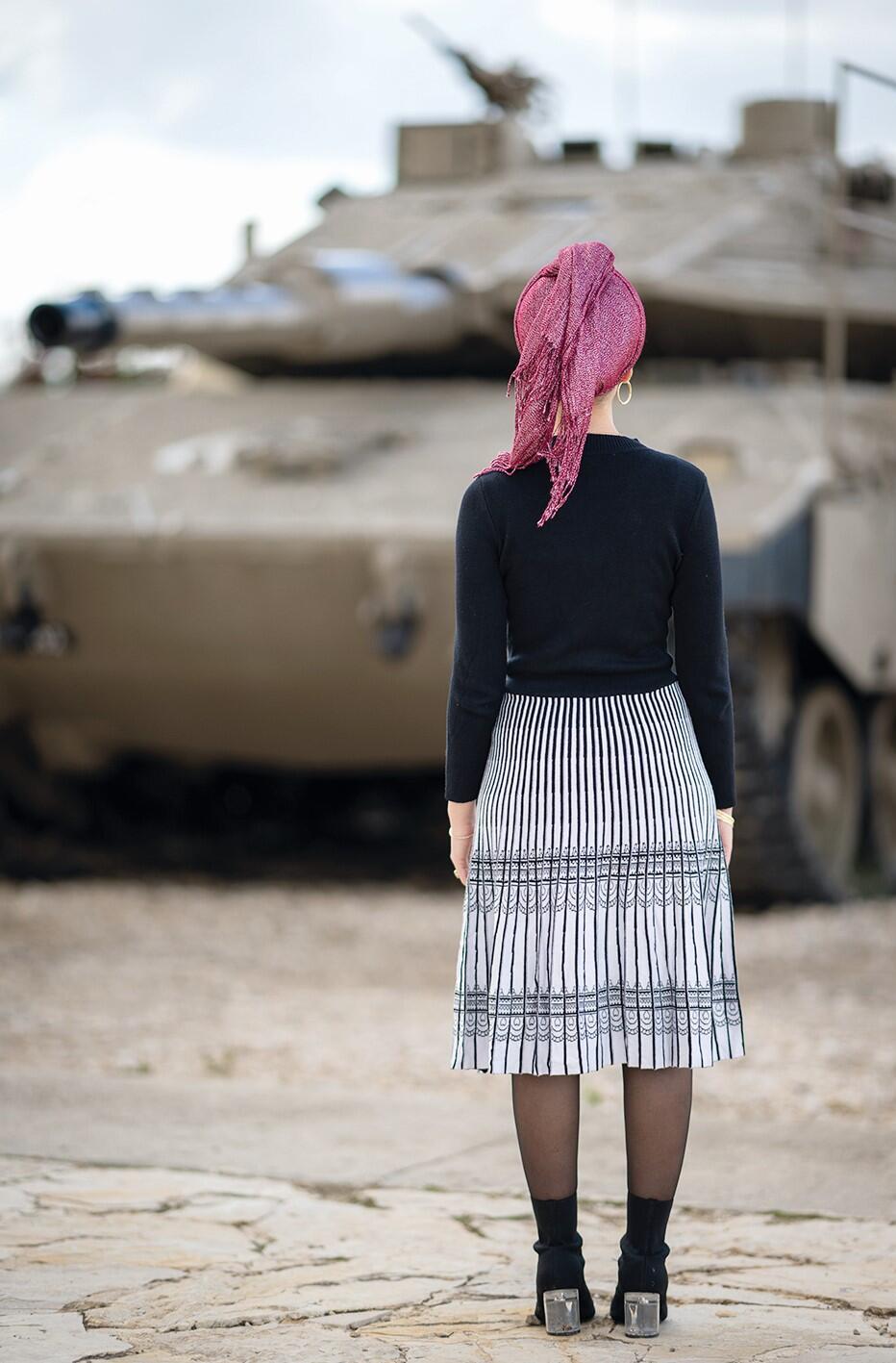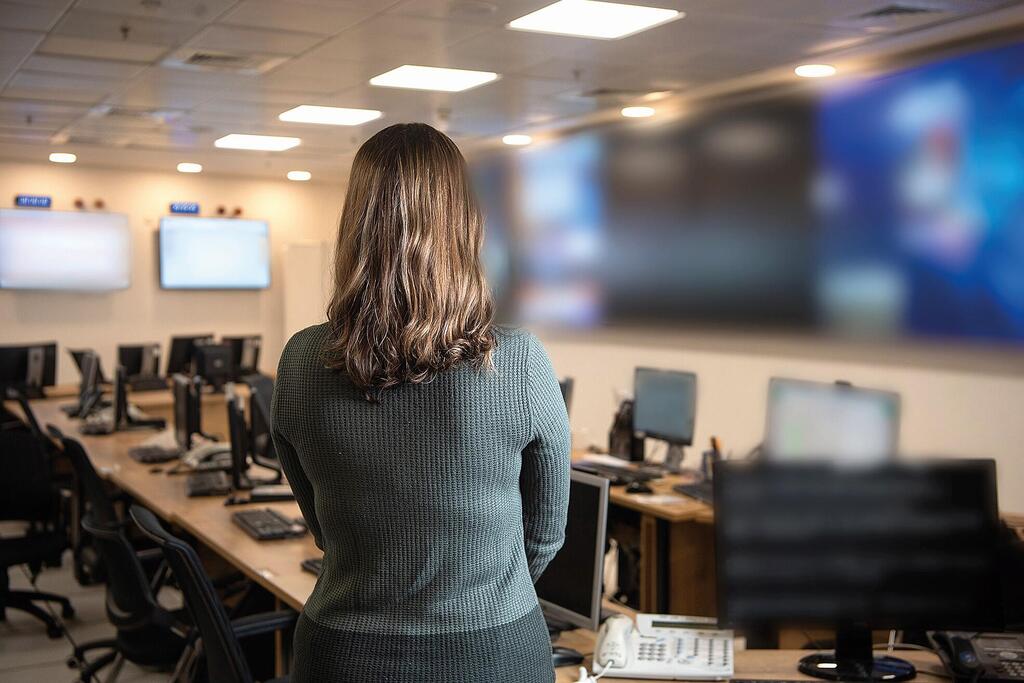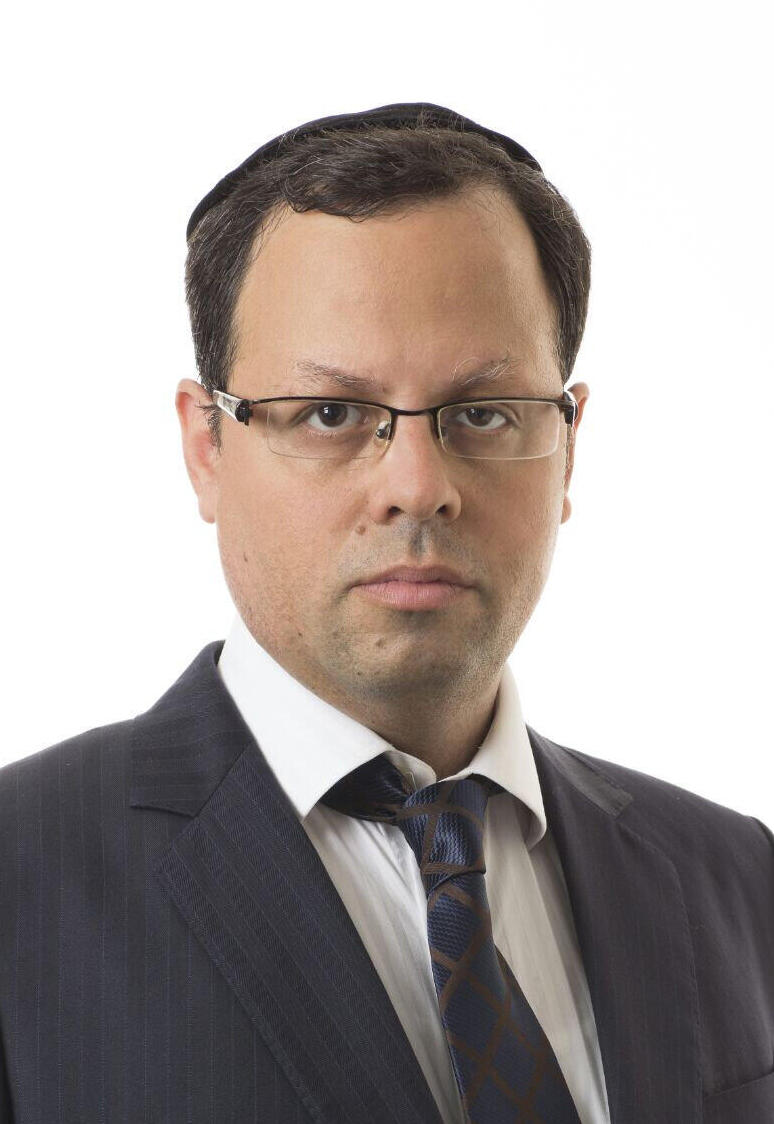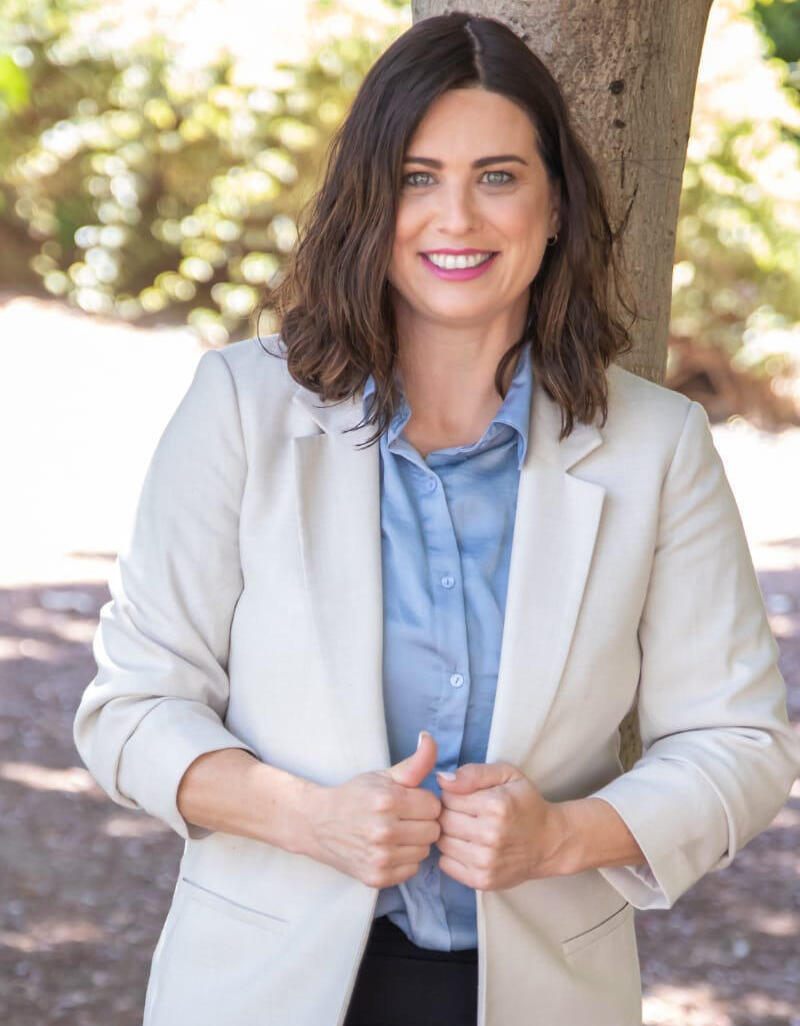"When I think about how my work ultimately reaches the field and saves soldiers' lives, I feel immense satisfaction. The developments I work on help expand soldiers' range of vision, allowing them to see from afar without physically entering enemy territory.
They can receive alerts about potential dangers outside, ensuring they know when it's unsafe to venture out. Honestly, watching videos of the 'Karnaf' drone enabling remote fire instead of soldiers risking their lives in hostile areas feels like a mission of utmost importance. It gives me an incredible sense of purpose, knowing that my work directly contributes to Israel's military efforts and to the Jewish people."
The speaker is not a young soldier in uniform but H., a 23-year-old Haredi woman, a newlywed who grew up in the Haredi city of Elad and now lives in Ramla with her husband. He is a yeshiva graduate from Be'er Ya'akov, and they are both members of Rabbi Elbaz's community, largely comprised of individuals who have embraced a religious lifestyle.
She holds a B.A. in Software Engineering from the Haredi college Lustig and an M.A. from Ashkelon College. Her husband spends half his day studying in a kollel and the other half working as a contractor. Due to her high-security clearance, her full name cannot be disclosed.
H. is one of 400 Haredi women, graduates of computer studies at Haredi colleges and seminaries, who have joined the IDF as civilian employees in technological units over the past four years as part of the "Hadassim" project, initiated by the Atidah organization in collaboration with the defense establishment. She is employed in the Yiftach Unit.
The organization recruits hundreds of young women for the project, prepares them for entrance exams and integration into a secular work environment, and ensures throughout their employment that their work conditions meet the needs of their Haredi lifestyle.
According to Lt. Col. (Res.) Keren Pinto, the IDF representative working with the project, there will already be 500 women participating by next year. Project graduates undergo several months of training to bridge the gaps between their studies and the demands of their roles and are integrated into roles lasting up to three years in the defense establishment's technological units.
In some cases, if the unit is interested, they continue working there as official employees of the unit, still in a civilian capacity. These women are employed in units such as the Air Force's Ofek 324, various Intelligence Corps units including 8200 and 81 (the special operations technology unit), the Ground Forces Technology Division, the Communications Corps, the Home Front Command, the Manpower Directorate, and in IDF-designated projects at Elbit Systems.
What do you do?
H.: "I develop tools and weapons that assist combat forces and sometimes protect them by performing various dangerous tasks in their place or, alternatively, providing soldiers with insights they wouldn’t have otherwise. For instance, I work on drone technologies for different missions, such as the 'Karnaf' drone, which combines suppressive fire capabilities, and the 'Zur' drone, Israel's first unmanned aerial vehicle. Additionally, I develop systems incorporating advanced algorithms for detecting elements in the field, aiding in the safe deployment of soldiers in hazardous areas, as well as enhanced versions of existing weapons and precise infrastructures for future developments."
How did the war affect you?
"I signed my employment contract before Sukkot 2023, and my official start date was October 8. The first three months of training were conducted via Zoom, followed by one month in person. It was emotionally challenging. On one hand, you're happy to start a new job, but on the other, how can you truly feel joy? From the very beginning, there was an intense motivation to give it my all."
In November of last year, when we at "Mamon" unveiled the "Hadassim" project in an article about the surprising integration of Haredi women into technology and computing roles within Israel's defense establishment, we couldn’t get even one woman to agree to be interviewed. This year, the situation is different. We managed to interview four women, though it wasn’t easy. Most women, particularly those from the more "hardcore" Haredi communities, including three wives of yeshiva scholars who received awards during the war, declined to be interviewed due to fear of backlash from their community. Even those who agreed cannot have their identities revealed due to their high-security clearance.
The four women I interviewed are married, wearing wigs or headscarves. I met H. and C. in Tzrifin, and interviewed N. by phone. N. (28), a yeshiva scholar's wife from a Haredi city and mother of a 4-year-old, works in Unit 8200 and plans to leave after three years. She graduated from a seminary with a focus on physical education instruction, but after two years in the field, she decided to switch paths. Her husband insisted she take aptitude tests, and after being found suitable for computing, she spent two years studying computer science while pregnant and working as a call center agent at Harel Insurance. Upon completing her studies, she joined the first cohort of the "Hadassim" project.
How did the war affect you?
N.: "The project gave me a sense of responsibility and pride knowing that I had something to contribute. Many in the Haredi community wanted to help with the war effort but didn’t know how. I truly could, and it felt amazing to become part of something bigger. What we developed was done at an incredible speed — something that would normally take months was completed in a matter of days. At the start of the war, I wasn’t updated on how the unit was using the developments I had worked on. Today, they make an effort to send us feedback — telling us, ‘Thanks to what you did, this and that happened,’ which makes you feel like part of something significant. Knowing that without my contribution, certain outcomes wouldn’t have been possible is incredibly moving.
"The connection to reality, even when working on technical projects, provides tremendous energy. During the first few months of the war, I worked extremely hard, from morning until 11 at night. I even came in for shifts on Fridays, but never on Shabbat. Seeing how much my young daughter was suffering, I started coming home in the afternoons and returning to work at night. One day, I brought her with me to the base, and she slept in a stroller. My commander saw this and said, ‘Enough, you’re giving your all, but you need to pace yourself for the long term.’ That’s when I switched to a mother’s schedule, working just eight hours a day."
C. (34) is also the wife of a yeshiva scholar and a mother of five, with children ranging in age from 18 months to 10 and a half years. She lives in a relatively new Haredi community and works as a software developer in the Ofek Unit, holding a senior position that cannot be detailed and a particularly high-security clearance. She graduated from a well-known and respected seminary in the Haredi sector, specializing in remedial education, and worked for eight years as an assistant in a classroom for students with learning disabilities.
"But I couldn’t support my family on a salary that was barely above minimum wage," she explains. "I took various computer courses, realized I loved the field, and decided that if I was going to pursue it, I’d do it thoroughly."
She completed her computer studies at a Haredi college in Bnei Brak. "The war changed my perspective on my work and increased its value in my eyes," she says. "I always knew I was working in an important place and loved my job, but the war added a sense of pride — that even as a Haredi woman, I am contributing in my own way, without compromising my values."
A. (24), a married mother of twins and a developer in the Ofek Unit: "When there was an event where our development was used, they sent us an email, and I felt proud. On the night of the Iranian attack, I felt like I was part of it. It's a feeling that's hard to describe."
My conversation with A. (24), a married mother of two-year-old twins from a Haredi city, took place on a bench in Palmachim, outside the building where she works. Entry into the building is prohibited without security clearance. A., born in Israel to an American Haredi family, develops an operational and highly relevant air defense system.
After completing her computer studies at a Haredi college, A. discovered she couldn’t find a job. "The industry downturn had already started. Women in the cohort above me had joined the Hadassim program, and they suggested I try it," she shares. "Starting my first job in the secular world was a shock for me. It took time to adjust to the different mentality. I also feared people would see me as someone hired out of charity and wouldn’t trust me with responsibility." But that wasn’t the reality. In the Ofek Unit, her performance on a critical and classified project earned her high praise.
A. has been with the unit for a year and a half, and during the war, she worked at a frenetic pace. "When there was an event where they used the system we developed, they sent us an email, and I felt immense pride. On the night of the Iranian attack, I felt like I was part of something. It’s a feeling that’s hard to describe," she says.
One of the interesting things the women talk about is the gap between the tension and conflict often portrayed in politics and the media between the secular and Haredi communities, and the atmosphere in everyday work environments. I asked them how their interactions with the secular public feel and vice versa.
N.: "There are things neither side fully understands about the other. Take something simple: on my way from washing my hands before eating a sandwich to actually sitting down and eating it, if someone says good morning, I can’t respond. According to Halacha, one shouldn’t speak between washing hands and eating bread or challah. So I explain, and people go along with it. Some people are hesitant to ask personal questions, and so am I. What’s considered appropriate or inappropriate in the secular world? In an innocent conversation about living room design, someone asked me, 'Where will you put the TV?' And I asked back, 'Don’t you have a large dining table in your living room?' Because in Haredi homes, the dining table is the centerpiece of the living room due to Shabbat and holiday meals."
H.: "I started work the day after I got engaged, and I was bombarded with questions: 'You dated for only two months, and you’re getting married in three months?' Then came the explanations — that it’s a common practice, that no one is forced to get married, and that there’s a process of checking compatibility. To me, it seems unusual when someone dates for a year and then decides not to marry.
This was the only topic where I was really questioned about my lifestyle. People genuinely tried to understand. Before my wedding, I approached my commanders and asked for a week off for the 'Sheva Brachot.' They told me, 'Family comes first.' They didn’t say, 'You just started, and now you’re asking for a week off,' as I had feared."
N.: "From my experience, when it comes to face-to-face interactions with people in the field, reality is entirely different from what’s portrayed in the media. We’re all human, with much more in common than differences, and we try to focus on that. On the other hand, I’ve also become more open-minded. I used to think all secular people go to the beach on Shabbat and that everyone is unfriendly. I learned that’s not true. It doesn’t shake my faith, but it does open me up to understanding things better and seeing the world with more nuance, not just black and white."
C.: "Everyone who’s supposed to interact with me — the team leader, who’s usually the unit commander, or others — receives a briefing in advance about Haredi customs: what to say, what not to say, what’s appropriate. They’re instructed on the laws of yichud (for instance, a man and a woman can’t be alone in a closed room), and how or if to compliment a woman. Besides, I’m not a soldier under their command and am not subject to military discipline. We receive a framework of spiritual classes — Torah lessons and special holiday lectures, similar to those in seminaries. We even have designated fun days for us, including pool access and dancing events at Hadar Dimol (a hall in Ramat Gan popular in the Haredi sector). They provide us with kosher meals under Rabbi Landau’s certification, but due to the taste, we often bring food from home. We have designated microwaves for meat and dairy, as well as a toaster oven and a refrigerator."
H.: "The lack of understanding goes both ways. At our first conference, I found it challenging. I didn’t understand anything because they kept using acronyms and abbreviations. The language is different. Take a term like hitpastanut — a slang expression used in Military Intelligence to describe persistent failure to solve a problem after a long effort. I had never heard it before. But you learn as you go."
Were you criticized for the fact that Haredi men don’t serve in the army?
N.: "We truly believe in the power of Torah study to protect and save. My husband stayed home to learn, and I contributed in my own way. I wasn’t attacked for it. There were a few people who wanted to hear my perspective on the matter. Yes, there are problematic issues, but even those conversations were more about curiosity than confrontation."
C.: "During COVID-19, it was less pleasant to be Haredi. Over the past year, every time there was a protest against Haredi enlistment, people came to ask us what we were protesting about, and we had to explain that it was a fringe group. On the other hand, many people tell us how much they admire us. I was never asked what I think about enlistment or why my husband is a yeshiva scholar. In daily work, there’s no politics. We respect each other. We’re not here to change one another. Even I had many stereotypes shattered — for example, that secular people are entirely disconnected from religion or that they all hate us. I grew up in a bubble in Bnei Brak."
Esti Solomon (47), a Haredi social entrepreneur from Beit Shemesh, mother of four, grandmother of three, and co-CEO of the "Atidah" organization alongside attorney Moshe Rubinstein, explains: "During the protests, the women told us they needed answers. We brought in a rabbi who explained to them that the Torah’s way is not one of violence. We support their yeshiva scholar husbands, but we don’t support violence. We’re not disconnected from what’s happening in the country. We constantly bring them lecturers and rabbis to address both fundamental Jewish issues and professional topics."
5 View gallery
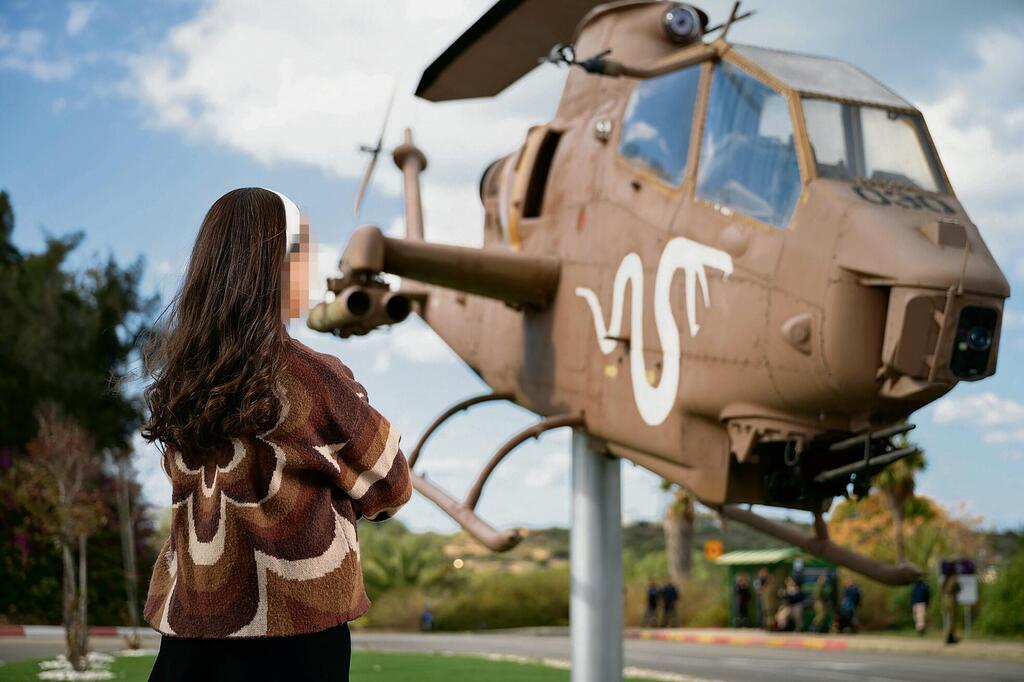

A.: "My father urged me to join the Air Force only because he always loved and connected with aviation, and I fulfilled his dream."
(Photo: IDF Spokesperson)
What about the reaction of the Haredi community? How do your families perceive your involvement?
N.: "My immediate family was very supportive. My father, who is a yeshiva scholar and was born abroad, was especially proud of me — perhaps because of his international background, they were enthusiastic. At the start of the war, when they understood my contribution — even though everyone knew my work was classified — everyone wanted to help me take care of my daughter, including my mother-in-law and neighbors. There were some people in the community, more distant acquaintances, who were less thrilled. I respect their opinions."
H.: "My family was very supportive as well. I assume there were people who raised an eyebrow, but not in a way that I felt."
A.: "In my community, which is mostly Anglo-Saxon, they are proud and happy for me. My father insisted that I work only in the Air Force because he always loved and was fascinated by aviation, and I fulfilled his dream."
C.: "Before joining 'Atidah,' I consulted rabbis who are well-regarded in the Lithuanian sector. One of the most prominent rabbis, upon hearing about the conditions under which the women work, said, 'I wish all the Wolf Seminary graduates who go into the computing field would work under such conditions.' My children know there is a connection between my work and airplanes, but of course, they don’t know exactly what I do or where I work. During an aerial flyover, they looked up at the sky, saw the planes, and asked me, 'Is that where you sit?'
"The Haredi community has become more open to employment in the computing field compared to the past. Previously, women would only go to companies like Matrix, which employed Haredi women in designated spaces without any interaction with men. Today, perhaps due to COVID-19 and remote work, more opportunities have opened up. However, the military is still a taboo subject, and the current anti-Haredi recruitment campaigns have only made it worse.
"The place where I work is not the concept of 'military' as the Haredi world knows it. It’s a workplace like any other, allowing me to work within all the restrictions and needs of my Haredi lifestyle. When my sisters and sisters-in-law, all yeshiva scholars’ wives working in programming, tell me, 'You don’t know what you’re missing by not working from home,' I point out that their workday never really ends. In contrast, my day ends when I leave the workplace after my hours as a mother, from 6:30 or 7 a.m. to 3 p.m."
The Hadassim program by "Atidah" began in 2017 with 13 women employed by the Air Force as part of a bold pilot initiative led by Esti Solomon. Solomon, a graduate of "The Old Seminary" in Jerusalem — one of the most prestigious educational institutions for Haredi women — decided at age 30 to pursue higher education at the Open University, where she could earn an academic degree without a high school diploma. She completed a B.A. in psychology, an M.A. in political science, and is now in her second year of a Ph.D. program at Bar-Ilan University. Her dissertation topic: "Haredi Women in the IDF."
In 2020, the Hadassim project faced a crisis and was at risk of being discontinued due to a lack of positions. That’s when attorney Moshe Morgenstern, a member of the Bnei Brak City Council, joined Solomon. He helped refine the program and convinced key stakeholders of its potential, securing funding and positions.
Currently, 170 women from the fourth cohort are completing their training. They were selected from approximately 1,500 applicants. Two weeks ago, registration for the fifth cohort opened, with 800 women already signed up, and "Atidah" predicts the number will reach about 1,700. Only around 200 will be accepted, while 100 women from the first cohort will complete their participation in the program.
Half of the program's participants are single, and the other half are married — approximately 90% of the married women are wives of yeshiva scholars who support their families. During training, participants receive salaries based on their prior education: 9,000 NIS for seminary graduates and 12,000 NIS for those with a B.A. degree. This salary continues during their employment, funded by the IDF, which employs them as civilian workers, with the Ministry of Finance providing the budget and approving the program's positions.
According to Solomon, the team commander in charge of the women is their direct employer, but they are not under military authority. They are civilian employees of the IDF: "Labor laws apply to them, and anyone who wants to leave can do so with two weeks' notice."
Lt. Col. Pinto adds: "Each position is currently allocated for three years, including the training period. After two years, a conversation is held with the employee — if she is interested, she continues for the third year, which happens with almost all of them. In cases where the units specifically need them as developers, they ensure positions for them to continue."
Those who leave the program easily transition into the workforce in the computing field, working for companies like Mobileye, Amdocs, private startups, the Israel Aerospace Industries, government offices, the National Cyber Directorate, Rafael, and more. "They reach senior positions as team leaders and executives, earning salaries of 30,000 NIS or more — three times what they earned as civilian IDF employees. The IDF provides them with the best employment experience, allowing them to build their careers and double or triple their salaries, significantly narrowing economic gaps," Pinto explains.
As a result of the program’s success, "Atidah's" budget soared from 1.5 million NIS in 2022 to 3.5 million NIS in 2024, thanks to donations from private individuals and foundations in Israel and abroad, most of whom are Haredi businesspeople.
Still, the program faces a significant challenge: the high-tech field is losing its appeal among the Haredi community due to the general difficulty of entering the job market. Two years ago, 1,300 women graduated from computing programs in Haredi seminaries, and several hundred more graduated from Haredi colleges. Last year, the number soared to 1,900, but a significant portion of recent graduates have yet to find jobs. Against the backdrop of the global high-tech downturn and the war, which have impacted the Israeli market, the chances of inexperienced graduates finding employment have significantly declined, especially for Haredi women. "The tensions between the Haredi and secular communities didn’t help either," says a professional who has been involved in integrating Haredi women into the computing sector for years. The result: a sharp 25%-30% decline in enrollment in computing tracks at seminaries, with a new "star" profession attracting Haredi women — fields like payroll accounting, bookkeeping, and other financial roles.
Solomon is trying to offer a solution by reaching out to Haredi women in peripheral areas: "We are working to secure funding for study and training centers in technological fields through evening programs in places like Netivot, Ofakim, and Tzfat. Parents in these areas often don’t have the means to fund technological study programs, and on the other hand, by 2026, many IDF bases will relocate to the Negev, creating a demand for additional workforce in the tech field. We are trying to create partnerships between donors, the government, and local authorities. The city of Netivot has already allocated a building for us."
C. sees another possible solution: "If the army agrees to conduct training for new cohorts in Bnei Brak, with instructors dressed in civilian clothing, there will be a flood of participants. For now, the army hasn’t agreed."
C.: "If the army agrees to conduct the training for new cohorts in Bnei Brak, with instructors dressed in civilian clothing, there will be an influx of women. For now, the army has not agreed."
The good news, on the other hand, is that the resistance to the Hadassim project from Haredi leadership, which accompanied it in its early days, has diminished. "There’s no public endorsement from leading rabbis, but there is silence because the community’s needs are great — the women who completed programming studies are sitting at home, losing their minds," says a source familiar with the program.
Attorney Morgenstern admits he was surprised by the caliber of women who applied to the fourth cohort of the program, which is about to complete its training. Among them are graduates from some of the most prestigious seminaries in the Haredi community, including daughters of rabbis and Hasidic rebbes, reflecting both a change in attitudes and the challenges graduates face in the job market.
"The main challenge of the Hadassim project," says Lt. Col. Pinto, "is to provide a work environment that aligns with the Haredi lifestyle of the women and to meet the units' growing desire to recruit them because of their significant contributions." Pinto praises the framework created by "Atidah," including the pre-employment training and the demand for appropriate working conditions, such as separate seating arrangements for men and women.
Attorney Morgenstern recalls: "A team leader — a commander who usually holds quarterly meetings at his home, including breakfast and lunch — approached me to ask if he could hold the meeting. He promised to provide strictly kosher meals. The answer was no. The meeting had to be held on base; it’s a workplace, not a social gathering. Today, teams better understand the complexity of the situation and that not all behaviors will be acceptable to the women."
According to Solomon, the women's performance during the war provided a significant boost to the IDF’s interest in integrating them into various technological units. Indeed, one senior officer involved in the project commented, "I was surprised by my encounter with Haredi women. They receive very high scores. Those unfamiliar with the Haredi community don’t realize that the women complete full core curriculums."
The growing demand from various units to recruit talented Haredi women has led to unexpected changes, such as adjustments to the requirements for obtaining security clearance. One question that previously disqualified candidates was whether any family member had ever served in the military. Many women answered "no" and were subsequently blocked. However, a campaign led by women who had passed all other aptitude tests succeeded in removing this question as a barrier.
Get the Ynetnews app on your smartphone: Google Play: https://bit.ly/4eJ37pE | Apple App Store: https://bit.ly/3ZL7iNv
Nevertheless, the IDF must carefully avoid creating any impression that these women are enlisting in the military. The struggle against the conscription of religious and Haredi women, which dates back to the early years of the state, remains one of Israel’s most contentious battles.
Major General Yaniv Assur, the former head of the IDF Manpower Directorate, who supported the project, continues to emphasize its social significance even after leaving his role: "The effort to integrate Haredi women into high-tech professions across the army’s branches and divisions has the potential to break down walls and build bridges. I am convinced they gain a deeper understanding of the army and Israeli society, and I see the impact of this interaction on IDF personnel who are not part of the Haredi community. I believe that direct interaction, daily engagement, and their contribution to national security foster greater social cohesion."


